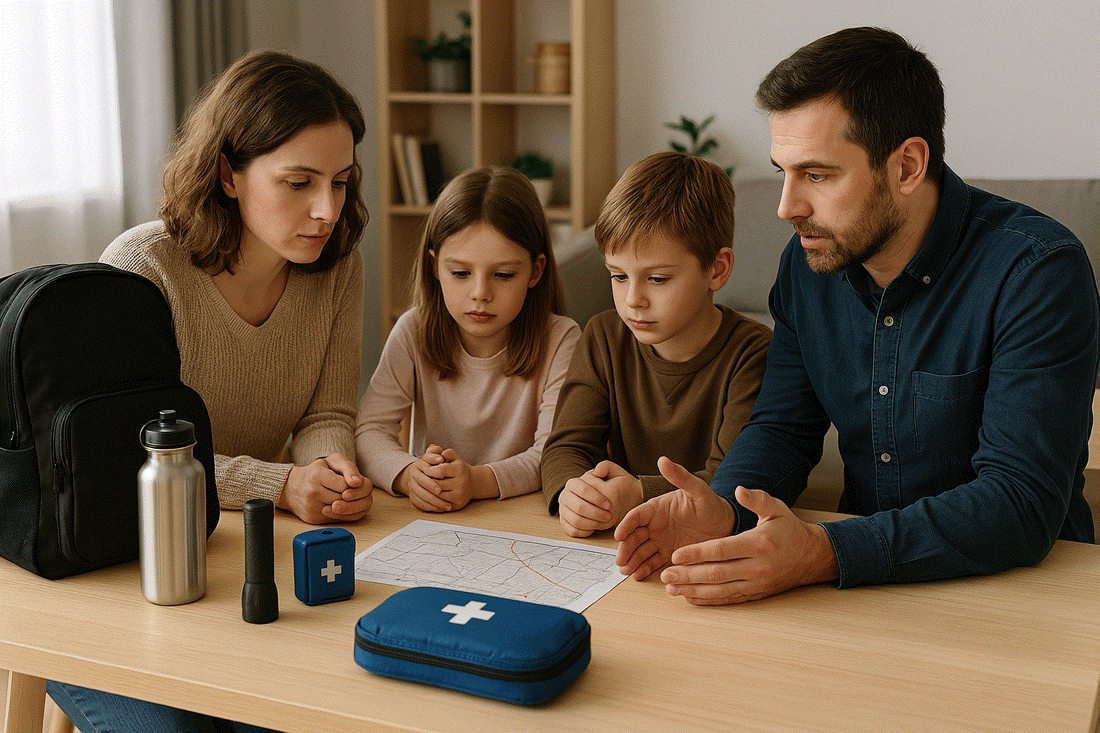
The Psychology of Preparedness: Why Families Delay Emergency Planning
Share
We All Know We Should Be Prepared. So Why Aren’t We?
In 2025, with the rise in climate-related disasters, infrastructure instability, and growing geopolitical tensions, the concept of emergency preparedness has never been more relevant in Europe. Governments and institutions are issuing more frequent alerts, and recommendations such as having a 72-hour emergency kit have become part of official communications.
And yet—most European families remain underprepared.
Statistically, over 70% of households across the EU do not have a clear emergency plan, nor the minimum essentials to face a disruption in basic services such as electricity, water, or internet. The problem is not a lack of information. Most people are aware that emergencies can happen. The problem lies elsewhere—in how we think, feel, and react to risk.
This article explores the invisible barriers that keep families from taking action, and how understanding them can help overcome inertia and move toward real readiness.
1. The Illusion of Control
One of the most common psychological traps is the illusion of control—the belief that, when something goes wrong, we’ll be able to improvise. We trust our instincts, our ability to make fast decisions, and our resilience. But in real emergency situations, stress levels spike and clear thinking often vanishes.
Most people overestimate their ability to respond effectively in a crisis. In truth, without a pre-established plan or basic equipment, families lose precious time—and that time can be critical.
Preparation is not paranoia. It’s structure. It’s giving your future self the tools to act quickly, not just react chaotically.
This is where a simple, pre-assembled 72-hour kit becomes not just helpful—but essential.
2. Optimism Bias: “It Won’t Happen to Me”
Humans have a powerful psychological filter known as optimism bias. We tend to believe that bad things happen to others, not to us. Even when we live in areas prone to flooding, storms, or blackouts, we often push the thought aside. “I’ll deal with it later.”
This subconscious belief is comforting—but dangerous. Emergencies don’t announce themselves in advance. They demand instant decisions. Being prepared isn’t a luxury. It’s a civic responsibility, especially when others depend on us.
Reframing the situation helps: you’re not preparing for you alone—you’re preparing for your family. Their safety is your priority. Action becomes a form of protection, not just precaution.
3. Decision Fatigue and Overload
One of the most overlooked reasons people delay emergency planning is simply mental exhaustion. Between work, parenting, bills, and the daily noise of modern life, few people have the bandwidth to research, compare, and assemble everything they might need in a crisis.
This is known as decision fatigue—when the brain is so overloaded that even simple tasks feel overwhelming.
The result? Inaction. Or endless “I’ll do it tomorrow” loops.
Directive72 was created to solve exactly this problem. With expert-curated selections and a fast configuration process, the burden of choice is removed. It’s simple, fast, and done in minutes.
You don’t need to become a survival expert. You just need a plan.
4. Fear and Avoidance
Talking about emergencies means confronting discomfort: vulnerability, danger, even death. As a result, many prefer to avoid the subject altogether. But avoidance doesn’t make risk go away—it increases it.
There is a powerful paradox here: the more you prepare, the less anxious you feel. Action is a form of mental relief. It transforms vague worry into specific steps.
As psychologist Tim Pychyl puts it: “Action is the antidote to anxiety.”
Starting small—like building a 72-hour kit—is not just a logistic decision. It’s a psychological milestone. It says: “I’m ready.”
5. The Family Factor: The Hidden Motivation
When people prepare only for themselves, the urgency can feel abstract. But when children, partners, or elderly relatives are involved, everything changes. Responsibility kicks in. The emotional motivation becomes stronger—and more permanent.
That’s why the most effective preparedness campaigns are family-focused. They’re not about fear. They’re about protection, foresight, and care.
You don’t need to be extreme. You just need to be responsible.
Conclusion – From Delay to Action: 5 Minutes Is All You Need
Most families delay emergency planning for reasons that are deeply human: overconfidence, optimism, fatigue, fear. Understanding these mental patterns helps us break them.
The good news? Preparedness doesn’t require weeks of planning. It requires one conscious decision—right now.
You don’t need a bunker. You just need a plan.
With Directive72, creating your emergency kit takes less than 5 minutes. No stress. No overthinking. Just peace of mind.


